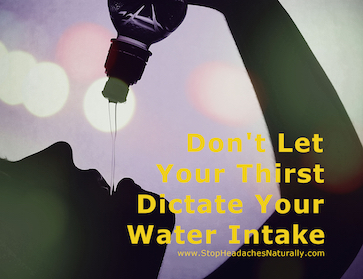Don’t Let Your Thirst Dictate Your Water Intake

Dehydration may seem a mild problem but even at a moderate level it can cause a lot of distress to an otherwise healthy person - if the problem is severe, it can even become life threatening. Our body is about 70% water and any decrease in this level can lead to many uncomfortable ailments including headache and migraines. So if you suffer from such complaints, it is important to keep your body well hydrated.
What is dehydration?
Dehydration is basically a deficiency of water in our body. In order for our body to function optimally, the balance between electrolytes and water needs to remain normal. When this balance is disrupted, we suffer from a number of physical symptoms that are collectively known as dehydration.
Common symptoms of dehydration
Following are a few of the most striking symptoms of dehydration:
• Headache
• Excessive thirst
• Dryness of mouth
• Dry, wrinkled skin with decreased elasticity
• Fatigue and weakness
• Muscle pain
Relation between dehydration and headache
The reason behind this is not clear but some studies have shown that it is due to the constricted blood vessels in the head that are trying to regulate the fluid levels and conserve water. This creates a deficiency of blood supply and therefore oxygen to the brain, creating a headache.
Dehydration can cause headaches and even trigger a migraine attack. The amount of pain may vary from person to person. It can be felt either in the front or back of the head or only on one side. There are some people who feel it throughout the entire head, mimicking a tension headache. A common symptom of a dehydration headache is increased pain with any head movement or walking.
Treating a dehydration headache
In order to treat a dehydration headache, you simply have to drink some water to rehydrate your body. It is best not to drink too fast. Instead, slowly drink 2-4 glasses of water and your headache will subside within a couple of hours. In some cases when you are unable to consume food or if a child is dehydrated, drink fluids that contain electrolytes such as a sports drink.
It is also important to rehydrate without sweating otherwise you will continue to lose fluids. So move to a cool environment or find some shade.
If the problem persists, it is best to consult a doctor who will prescribe I.V. fluids for faster recovery from dehydration.
Preventative measures
Drinking enough water throughout the day is the best way to prevent dehydration headaches. Although 6 - 8 glasses of water (1.5 - 2 litres) is considered ideal, this will vary according to your weight, physical activity and whether you live in a warmer climate or higher altitude.
Many people fall in the trap of never drinking enough water because they never feel thirsty - don’t let your thirst dictate your water intake. It is recommended to drink enough water so your urine is clear and a pale yellow colour.
Refrain from alcohol and excessive caffeine, because they act as a diuretic – leading to dehydration. Fruits and vegetables are great for health and energy but they are not a substitute for drinking water.
Image: spongysponge
________________________
Pablo Tymoszuk is a soft tissue therapist specialising in remedial, myofascial and dry needling techniques. He also acts as an ergonomic specialist and wellness consultant which has motivated him to co-author the eBook Stop Headaches Naturally.
Together with Dr Margaret Scarlett they present a range of strategies for stopping headaches and migraines without drugs. All strategies are organized in a systematic manner and backed up by references to the scientific literature.





